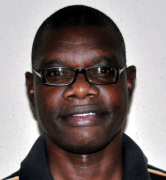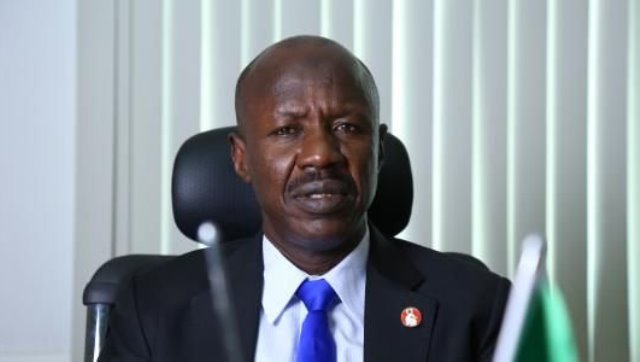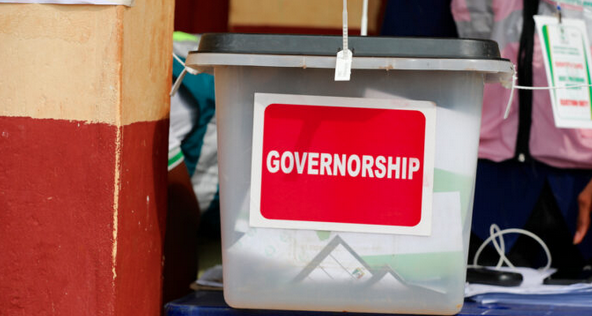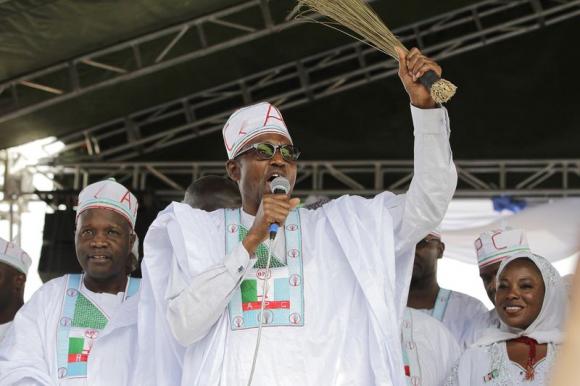Nigeria has long been dubbed as “a country of anything goes” by some disembodied intuitive voice that one regrettably fails to publicly give deserved credit in this piece. This is not intentional. It is because one is crassly ignorant regarding the coiner and the contextual backdrop of this obviously more than fitting phrase. And that’s painful. However, one looks forward hopefully to another day of making up for this innocent lapse in subsequent interventions.
Although now thoroughly hackneyed, the phrase has defied fatigue. And this is so because that ascription truly fits the country despite its varied galling pretences. Indeed, Nigeria is “a country of anything goes”. No one should be more conscious of this depressing label now than Ibrahim Magu, the beleaguered police officer and former acting chairman of the Economic and Financial Crimes Commission (EFCC) who was chucked out of office in a most humiliating fashion and left pining away in a void until his retirement from the police on attaining the statutory age of 60 in public service.
Magu’s story of almost five years at the helm of EFCC affairs in an acting capacity must be mentally disturbing for him, and even for his close friends and well-wishers. Now, more than anyone else, he would realise that the country he calls his own and for which he had often thumped his chest as a patriotic first-rank anti-corruption warrior, is a typically aberrant, wayward and perverse space driven in almost every sense by depraved impulses.
At the height of his power, when all seemed good, Magu had declared publicly that after God, his only object of dread was Muhammadu Buhari, the president who brought him in as a key figure in the ‘change’ agenda and had sworn from his very first day in office to give corruption a bloody nose. Yet, no sooner had the president delivered the pledge than the people who elected him discovered that he was wearing kid gloves instead of hard gloves fitted with sturdy spikes.
Advertisement
It was little surprise then that for nearly five years Buhari couldn’t even muster the decisive punch to make Magu the substantive chairman of EFCC. Amid the intriguing back and forth with the senate and the state security service which he controls, the president couldn’t make his authority count with respect to his appointee’s confirmation by the senate. This singular act of surrender must form the preface in any book documenting the history of Buhari’s capitulation in relation to the anti-corruption campaign.
As the president casually walked away from his promise to fight corruption, the vultures expectedly swooped in. His attorney-general and minister of justice, Abubakar Malami, who belongs to an elite lawyers’ group referred to as The Silk, took charge. But to fully have his way, he must first seize control of EFCC by clipping Magu’s wings to the extent of making him worthless. He started by ordering Magu to hand over to the justice ministry all the files of high-profile corruption cases on his table. Magu ignored him. And that set the ground for the kind of assault to which the policeman surely might not have been subjected in all his years in public service. Malami, the chief law officer who since his appointment has audaciously parlayed his office to fend for himself in far more ways than his predecessors put together, turned the screw on the EFCC boss for daring to hold ground. He threw all sorts of dirt at him, including dispatching a long memo to Buhari wherein he accused Magu of corruption and insubordination.
Then one morning in July 2020, before Buhari finished digesting the contents of the memo it seems, Magu was forcibly seized on the streets of Abuja by armed security agents and hauled off like one hardened criminal on the wanted list to Aso Rock Villa where, unknown to most Nigerians, an investigation panel headed by Isa Ayo Salami, a judge of repute and ex-president of the court of appeal, had been sitting for weeks. Magu was promptly locked up and the following day Buhari suspended him as acting chairman of EFCC. He was released after four days to face the Salami panel that was clearly heavily rigged in favour of his accusers. Except for the chairman Salami himself, all others on the panel were Magu’s accusers either directly or indirectly. That, in itself, and the main accuser should know better, is a ringing repudiation of the fundamental philosophy of justice, equity and fairness. Discerning lawyers rose to lend their voices against the abnormality, citing the judgment of the supreme court in the case of Chief Gani Fawehinmi vs Legal Practitioners Disciplinary Committee ([1985] 2 NWLR (Pt. 7) p. 300) to make the point that with the structure of the Salami panel, Magu’s condemnation was inevitable.
Advertisement
The full extent of appropriating anything other than justice in the panel’s investigation can only be appreciated if placed side by side with the rejection of the call for an open trial for the head of the country’s foremost anti-corruption institution facing corruption charges, gathering evidence behind the accused and not giving him the petitions in advance of his defence. Local and foreign activists and anti-corruption groups including Human and Environment Development Agenda (HEDA), Resource Centre, Global Witness, Cornerhouse and Re: Common also weighed in accusing, the panel of lack of transparency and of being unfair to Magu.
Magu was ready to confront his accusers before the panel. His lawyer, Wahab Shittu, applied to the panel requesting that Malami be subpoenaed as a witness to substantiate his allegations. The panel obliged and wrote to Malami to appear. But instead of showing up as he had earlier boasted in public that he would appear if summoned, the chief law officer chickened out, brazenly disobeying the panel and stating that his refusal to testify was “purely constitutional and not based on any ulterior motive”. Of course, that’s not true. Malami refused to come before the panel simply because he had no single evidence to prove his allegations against the accused. After about four months of investigation, the panel submitted its report to the president. Meanwhile, Magu has long since been effectively replaced at EFCC.
It’s now one and a half years since the presidency received the report. Nothing has been heard from a government whose main item of campaign in 2015 was the fight against corruption. Of course, we now know that corruption has always prevailed and that there has never been any meaningful fight by the Buhari government aimed at eradicating it.
For the sake of clarity, no one said Magu is a saint without sin. People only demanded that if there are offences he’s known to have committed, then he should face trial in accordance with the rule of law. But clearly, there’s no offence to be tried because evidently no solid evidence has been established upon investigation to warrant his prosecution. And that is why the Salami report is gathering dust on the shelf in an office in the villa.
Advertisement
Even the Police Service Commission has said there is nothing before them stating Magu’s offence(s) for which he can be disciplined, either through denial of promotion or by the withholding of retirement benefits. All the PSC has been receiving are verbal instructions from powerful vested interests who are insisting on prolonging the persecution.
It would be difficult for Magu to say that his experience as a public servant since July 2020 has not been one of the bitterest yet. Now, as he was deliberately completely shut out for the clock to wind down to his retirement on May 5, 2022, he would have come to the full awareness that in “a country where anything goes,” the prevailing system is the tyranny of power. And that in the end, on a really sad note, Nigeria is a difficult place to serve.
Onyeacholem works at AFRICMIL. He can be reached via [email protected]
Advertisement
Views expressed by contributors are strictly personal and not of TheCable.
Add a comment







